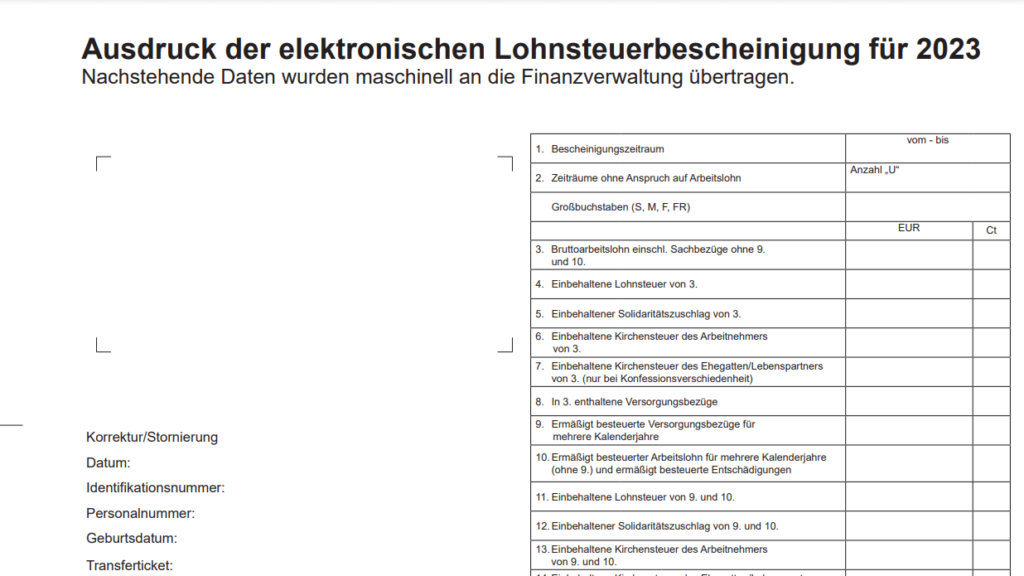Tax laws can be a daunting for many individuals, especially when faced with unfamiliar terms such as “Außergewöhnliche Belastungen” in German tax regulations. Translating to “extraordinary burdens” or “exceptional expenses,” this concept plays a crucial role in allowing taxpayers to deduct specific costs from their income. In this blog post, we will delve into the details of “Außergewöhnliche Belastungen” and explore the types of expenses that qualify for this deduction.
Understanding Außergewöhnliche Belastungen
Außergewöhnliche Belastungen refers to extraordinary burdens that go beyond the usual financial strains encountered by taxpayers. These exceptional expenses can be categorized into various types, each subject to specific criteria and limitations.
1. Medical Expenses
Medical expenses can be considered in Außergewöhnliche Belastungen (extraordinary burdens) in the context of German tax law. To qualify for deductions, these medical expenses must meet specific criteria outlined by tax authorities. Here’s a detailed explanation of how medical expenses are considered in Außergewöhnliche Belastungen
- Uncovered Medical Costs: The primary criterion for medical expenses to be considered as extraordinary burdens is that they are not covered by health insurance. This includes out-of-pocket costs for medical treatments, procedures, medications, and other health-related services that are not reimbursed by insurance.
- Chronically ill or Disabled Individuals: Medical expenses incurred for the care and support of chronically ill or disabled individuals may qualify for deduction. This could include the costs associated with special equipment, home modifications, and other accommodations that enhance the quality of life for the person with a chronic illness or disability.
- Prescription Medications: Costs related to prescription medications that are not covered by health insurance can be considered in Außergewöhnliche Belastungen. This is particularly relevant for individuals with ongoing medical conditions that require long-term medication.
- Alternative Medicine: In some cases, expenses for alternative or complementary medical treatments that are not covered by health insurance may be eligible for deduction. However, it’s essential to carefully review the specific rules and limitations regarding alternative medicine expenses.
- Transportation and Travel Costs: If a patient incurs additional transportation or travel costs for medical treatments that are not covered by insurance, these expenses may be considered in Außergewöhnliche Belastungen. This could include travel to specialized medical facilities or appointments.
- Nursing and Care Costs: Costs associated with nursing care, home care, or other forms of caregiving that are not covered by insurance can be included in extraordinary burdens. This is particularly relevant for individuals who require extensive care due to medical conditions.
1.1 Threshold for Deduction
To qualify for deductions under Außergewöhnliche Belastungen, including medical expenses, taxpayers must surpass a specified threshold. This threshold is determined as a percentage of the individual’s income and varies based on factors such as marital status and the number of dependents. The thresholds are structured as follows
- Up to €15,340:
- Childless, unmarried: 5%
- Childless, married: 4%
- With 1 or 2 children: 2%
- 3 children and/or more: 1%
- From €15,341 to €51,130:
- Childless, unmarried: 6%
- Childless, married: 6%
- With 1 or 2 children: 3%
- 3 children and/or more: 1%
- Starting at €51,131:
- Childless, unmarried: 7%
- Childless, married: 6%
- With 1 or 2 children: 4%
- 3 children and/or more: 2%
These percentages represent the income thresholds at which the deduction rates apply. For instance, if a taxpayer’s medical expenses exceed the applicable percentage of their income based on the thresholds outlined above, they may qualify for deductions under Außergewöhnliche Belastungen. It is crucial for taxpayers to be aware of these thresholds and percentages to ensure accurate reporting and optimization of available tax benefits. Professional advice can be valuable in navigating these intricate calculations and ensuring compliance with the prevailing tax regulations.
2. Disability Costs
In German tax law, disability costs can be considered as Außergewöhnliche Belastungen (extraordinary burdens), allowing individuals to deduct certain expenses related to disability from their taxable income. Individuals facing disability-related challenges may qualify for deductions on expenses such as special equipment, home modifications, or care services aimed at improving their quality of life. Here’s a detailed explanation of how disability costs can be taken into account
- Definition of Disability Costs: Disability costs include expenses incurred to accommodate and support individuals with disabilities. This can encompass a wide range of expenditures aimed at improving the quality of life, independence, and overall well-being of the person with a disability.
- Special Equipment and Assistive Devices: Costs associated with the purchase, maintenance, or repair of special equipment or assistive devices designed to aid individuals with disabilities are eligible for consideration. This may include wheelchairs, hearing aids, adaptive computer technology, and other devices that enhance daily living.
- Home Modifications: Expenses related to modifying a home to accommodate the needs of a person with a disability can be considered in Außergewöhnliche Belastungen. This might involve installing ramps, widening doorways, or making other structural adjustments to facilitate accessibility.
- Costs of Personal Assistance: If individuals with disabilities require personal assistance or care services that are not covered by insurance, the costs associated with hiring caregivers or personal assistants can be taken into account.
- Training and Rehabilitation: Expenses incurred for training programs, rehabilitation services, or therapies aimed at enhancing the skills and abilities of individuals with disabilities may qualify for deduction. This could include vocational training, physical therapy, or other rehabilitation services.
- Transportation Costs: Additional transportation costs incurred due to a disability can be considered, such as expenses related to accessible transportation or modifications made to a vehicle to accommodate a disability.
- Communication Aids: Costs associated with communication aids, such as speech-generating devices or specialized software, may be eligible for deduction if they are necessary for individuals with disabilities.
2.1 Threshold for Deduction
To qualify for deductions under Außergewöhnliche Belastungen, particularly for disability costs, the degree of disability (GdB) and characteristic signs (Merkzeichen) play a significant role in determining the lump sum to which an individual is entitled.
| level of disability (Gdb) | lumpsum from 2021 |
| 20 | €384 |
| 30 | €620 |
| 40 | €860 |
| 50 | €1,140 |
| 60 | €1,440 |
| 70 | €1,780 |
| 80 | €2,120 |
| 90 | €2,460 |
| 100 | €2,840 |
Furthermore, if an individual has a characteristic sign (Merkzeichen) indicating a pronounced disability, such as “H” for “helpless” or “Bl” for “blind,” the lump sum entitlement is increased to €7,400 euros (previously €3,700 euros). This adjustment reflects the heightened financial burden associated with more severe disabilities.
3. Funeral Costs
Funeral expenses incurred for the burial or cremation of a deceased family member can be considered in Außergewöhnliche Belastungen. These costs include funeral service fees, cemetery or crematorium expenses, costs associated with the purchase of a burial plot or urn, and any other related expenditures. It’s important to note that these expenses must not be covered by any form of insurance to be eligible for deduction.
Expenses like providing catering for attendees during the funeral ceremony are not considered extraordinary burdens and are not eligible for deduction.
4. Natural Disasters
Damages or losses resulting from natural disasters may qualify as extraordinary burdens if they are not covered by insurance. This could include expenses related to repairing or rebuilding a home, replacing personal belongings, or addressing other financial losses incurred due to events such as floods, earthquakes, or storms. Taxpayers need to provide documentation to substantiate the costs and demonstrate that insurance coverage did not sufficiently address the financial impact.
Conclusion
Außergewöhnliche Belastungen serves as a critical component of German tax law, offering a means for individuals to alleviate the financial strain caused by extraordinary burdens. Whether facing medical expenses, disability costs, funeral expenses, natural disasters, or extraordinary care costs, understanding the criteria and seeking professional guidance can help taxpayers navigate the complexities of this tax provision effectively. By staying informed and leveraging available deductions, individuals can optimize their financial well-being while fulfilling their tax obligations.
Understanding these thresholds, lump sum amounts, and characteristic signs is essential for individuals with disabilities seeking to optimize their deductions under Außergewöhnliche Belastungen. Professional advice is recommended to navigate the intricacies of these calculations and ensure accurate compliance with tax regulations.


